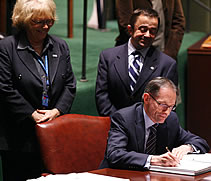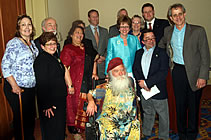Act Now

Empower U: Learn to Access Your Disability Rights Training on Canadian Human Rights, the Convention on the Rights of Persons with Disabilities (CRPD) and its Optional Protocol (OP) training aims to increase awareness of how to address discrimination using more familiar Canadian human rights laws such as Human Rights Codes and the newer international Convention on the Rights of Persons with Disabilities (CRPD). This is training for persons with disabilities by persons with disabilities. The training is part of a project funded by Employment and Social Development Canada and implemented by the Council of Canadians with Disabilities (CCD) in collaboration with Canadian Multicultural Disability Centre Inc. (CMDCI), Citizens With Disabilities – Ontario (CWDO), Manitoba League of Persons with Disabilities (MLPD) and National Educational Association of Disabled Students (NEADS). Read more.
Sign Up for our monthly digest
A monthly newsletter from CCD about what is happening in the community
Re-Integration Of Landmine Survivors: The Self-Help Consumer Approach
Related Documents
January 1, 2005
Canada and the Global Landmine Crisis: Update
January 1, 2005
The Landmine Crisis: Designed to kill and injure, to impede
Background
Antipersonnel landmines (APM's) are a major cause of disability in many developing countries. APM's are estimated to disable over 1,000 people each month in 64 countries around the world. In Cambodia, for example, one out of every 236 citizens is a landmine survivor. Angola has 9 million mines deployed within its borders and the mines disable several hundred people every week.
Today there are more than 110 million landmines planted and active in 64countries around the world. Clearly APM's are significant economic barrier to reconstruction after armed conflict. The deployment of mines is a major hindrance to refugees returning home, and mines cause millions of acres of arable land to be left deserted. In countries that were once self-sufficient in food this has caused increasing dependence on international food aid.
Against this stark background many Development NGO's have initiated programs to respond to the many facets of this complex set of issues, among these are certainly the needs of landmine survivors. In most cases such programs aim to stabilize the physical condition of the patient and provide some vocational training. However the programs currently in operation do not address the comprehensive needs faced by newly disabled people as they re-enter their communities after medical treatment is completed.
Disabled people's self-help groups have organized in 110 countries around the world under the umbrella of Disabled Peoples' International (DPI). These groups manage programs in which disabled people design and implement their own competencies, they incorporate their perspective on services, and they take a comprehensive approach to the cultural, social, economic, and political needs, of disabled people in their communities.
Rationale
As awareness grows of the impact of anti-personnel landmines on innocent civilians, the UN and other development agencies have begun to respond to the problem. Many of these agencies have experience in development
programming, but little experience with working with people with disabilities. In light of this they often commit large resources to rehabilitation projects that deal with disabled persons as passive recipients of treatment rather than as persons who can make a continuing contribution to their communities.
The rehabilitation process is not one simply of medical treatment and the supply of suitable mobility equipment. The process is wide-ranging and involves addressing psychological and emotional trauma, prevalent myths of helplessness, the lack of economic opportunities, and social and structural barriers that curtail participation. These issues cannot be addressed by medical personnel alone. They must be addressed through support group structures, set up and conducted by persons with disabilities, who together learn role model techniques aimed at overcoming social and physical barriers, and work towards achieving full economic and social integration.
The Council of Canadians with Disabilities (CCD) has learned over two decades of working with people with disabilities that the most effective approach is one in which disabled people have the major role in designing and implementing their own programs for re-integration.
This approach builds into the re-integration process an understanding that people with damaged limbs continue to retain many of their personal skills, and they can continue to make a valuable contribution to the productive work of the community. With appropriate equipment these individuals can also significantly overcome their physical limitations and perform meaningful physical roles. It is extremely important to the re-integration process that participation by injured people be a significant and real component of programs. Not only does this ground the process in the repeated example and practice of competence for individuals, which is essential for their self-image, but the visible exercise of this competence also deals decisively with social stigmas in the community.
The re-integration approach is cost-effective. The cost of mobility aids and community-based rehabilitation represents an initial investment which is significantly less than that of establishing and maintaining an institution. Experience has shown that while people with disabilities are reluctant to make use of institutional care, especially in developing countries, they readily make use of community-based rehabilitation because it complements their own efforts to reintegrate into their communities. As disabled people find ways to become productive they become net contributors to their economies rather than burdens on their friends and families.
CCD and its partners view are keen to pilot the approach outlined in more detail below. We believe that it could develop a new methodology for landmines interventions world-wide. The collaboration of health specialists and disability self-help groups is a unique approach that is expected to prove to be low cost, culturally and structurally appropriate, and highly effective in re-integrating amputees into their home communities.
Developing Self-Help Organizations Overseas
Member-run, cross-disability groups in which disabled people address their own issues and priorities have organized in 110 countries around the world. They have formed an umbrella organization called Disabled People's International (DPI). Some of these groups have only recently formed and they have not yet acquired the techniques and organizational structures they need to make their programs fully operable. In countries such as Afghanistan and Cambodia disability groups are not yet equipped to take on the enormous task of addressing the disablement of their populations due to landmines.
The NGO / Disability Partnership: A New Paradigm
Overseas development agencies have expertise, organizational capacity, and financial resources to implement medical and development assistance programs for landmine survivors, and many are in the planning stages of large-scale programs of this kind. But while these organizations are highly capable, in the technical sense, to undertake physiological rehabilitation, many lack familiarity with consumer-directed approaches. Very Successful examples of this have been pioneered in Canada by such agencies as CCD, and the Canadian Paraplegic Association.
Objectives
- provide consultation in planning with Canadian development agencies so that the consumer-run (self-help) model may be incorporated into design of programs for landmine interventions overseas
- participate in needs assessment and implementation in countries where programs are to be delivered
- assist people with disabilities to organize themselves democratically, with full participation, in countries where landmines programs are to be implemented
- make available information, advice, and expertise on employment creation programs developed by people with disabilities

Canada signs the Declaration on the Rights of Persons with Disabilities at the United Nations. Members of the Canadian Delegation Steve Estey, Chair of CCD’s International Committee, and Dulcie McCallum observe Canada’s ambassador make this historic commitment.

HRSDC Minister Diane Finley, Defense Minister Peter MacKay, NDP Disability Critic Judy Wasylycia-Leis, Liberal MP Mike Savage, Liberal MP the Hon. Carolyn Bennett and Bloc MP Yves Lessard joined leaders from the disability community at a CCD celebration of Canada's ratification of the CRPD.
